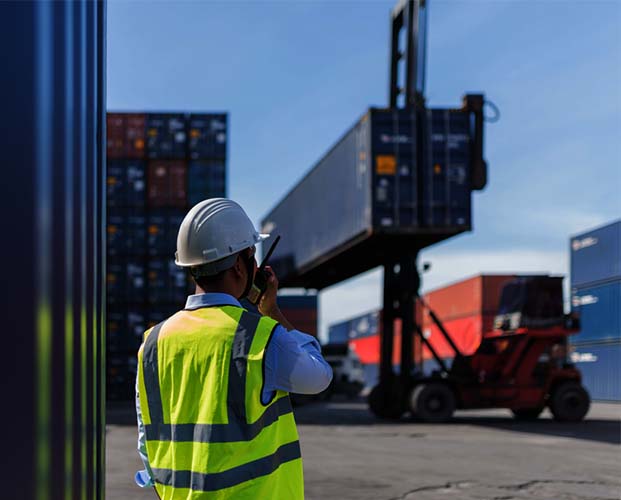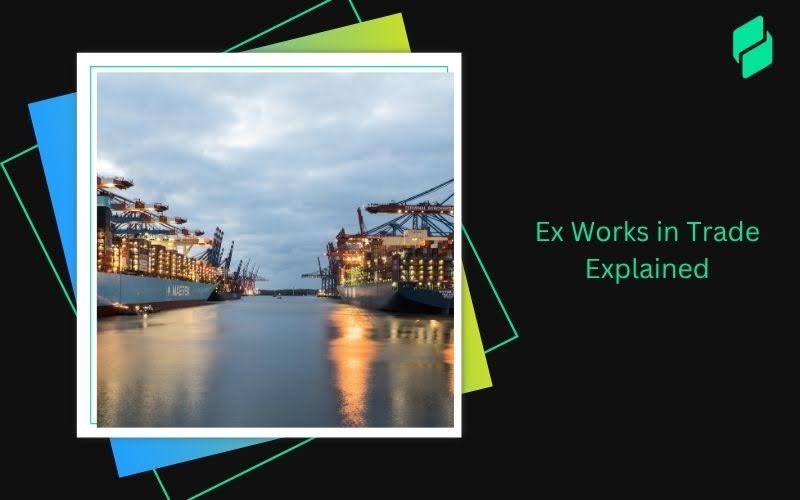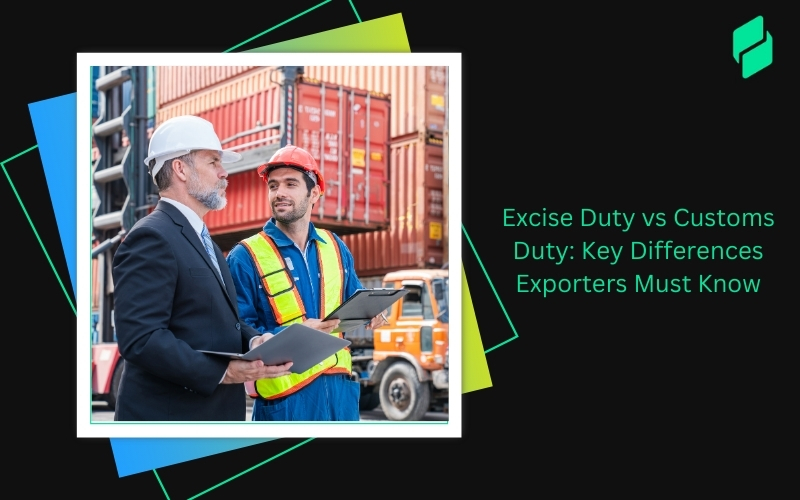Optimize your business: use unlimited savings with Pazago fulfilled now!
Get Started ->You're sourcing products from overseas, and an invoice lands in your inbox. You come across this term called Ex Works. You've seen it before, but what does it actually mean?
It may sound like just another shipping label, but the Ex Works (EXW) term plays a significant role in international trade. It marks a clear line. The seller's job ends once the goods are ready for pickup. From there, it’s all on you, the buyer, to handle loading, customs, freight, and final delivery.
Ex Works often appears in supplier quotes from countries such as China, Vietnam, or India. It is common because it favors the seller and puts control and risk in the buyer’s hands. If you don’t fully understand what this term demands, it’s easy to miscalculate costs or miss critical steps.
This blog will break down the ExWork meaning in plain terms, how it affects your role as a buyer, and what you should watch out for when you see it in a contract.
TL;DR
- Under EXW, the seller makes goods available at their site. From that point, the buyer handles loading, export clearance, shipping, insurance, and delivery.
- EXW is best suited for buyers with a strong logistics network and a good understanding of local regulations in the seller’s country.
- Export formalities fall on the buyer, which can be challenging without a local presence or customs expertise.
- The 2020 update to EXW clarified security obligations and transport documentation to reduce confusion in cross-border trade.
- Buyers must manage pickup, documentation, compliance, and international delivery. Efficient coordination is essential for smooth execution.
What is Ex Works in International Trade?
Ex Works (EXW) is one of the most commonly used international trade terms under the Incoterms (International Commercial Terms) rules defined by the International Chamber of Commerce (ICC). The exwork meaning refers to a shipping arrangement where the seller makes the goods available at their premises (factory, warehouse, etc.), and the buyer takes full responsibility from that point onward.
This means the buyer bears all costs and risks associated with transporting the goods. These include pickup, export documentation, customs clearance, loading, international shipping, and final delivery.
When to Use Ex Works:
- When the buyer has a strong logistics network in the seller’s country.
- When the buyer wants full control over the shipping process.
- When the seller wants minimal responsibility beyond manufacturing and packaging.
Example: A furniture manufacturer in Poland agrees to sell a shipment of chairs to a retailer in the US under Ex Works terms. The retailer must arrange pickup from the Polish warehouse, handle all export formalities, book ocean freight, clear US customs, and transport the goods to their final destination.
EX Works Incoterm 2020 Rule: Major Changes and Updates
The 2020 version of Incoterms retained the core of EXW unchanged. The seller makes the goods available at their premises, and the buyer handles everything after. However, it clarified language around security obligations and transport documentation. These updates aim to reduce confusion, particularly in cross-border transactions where export controls and regulations are more stringent.
Also Read: Differences between CIP and CIF Incoterms
Key Features of Ex Works Incoterm
To understand the Exwork meaning in global trade, it's essential to examine what Incoterms actually require from both the seller and the buyer. Ex Works (EXW) places the maximum responsibility on the buyer and minimal obligation on the seller.
Here are the key features that define the EXW arrangement:
- Seller's Minimum Obligation
Under EXW, the seller's responsibility ends once the goods are made available at their premises, whether it's a factory, warehouse, or any agreed location. The seller does not handle loading the goods on the transport vehicle or clearing them for export.
- Buyer Handles All Costs and Risks
The buyer takes on all transportation, insurance, export documentation, customs duties, and any other costs from the seller’s door to the final destination. This includes:
- Loading at the seller’s premises (unless otherwise agreed)
- Inland transport
- Export and import clearance
- Freight charges
- Insurance
- Delivery to the final destination
- Loading Not Included by Default
Unless specifically stated in the contract, the seller is not required to load the goods onto the buyer’s transport vehicle. If the buyer wants the seller to assist with loading, this must be clearly agreed upon beforehand.
- Best for Experienced Buyers
EXW is ideal when the buyer has a well-established logistics network and local knowledge in the country of origin. It gives the buyer full control over the shipping process, which can lead to cost savings if managed efficiently.
- Limited Use in International Trade
Because the buyer is responsible for export formalities (which may require a local presence), EXW is often used in domestic or intra-regional trade. For cross-border transactions, Incoterms like FCA (Free Carrier) are typically preferred.
With everything in place, let us now discuss the responsibilities of buyers and sellers in Ex Works in international trade.
You Might Also Like: Understanding Incoterms in International Trade
Responsibilities of Buyers and Sellers in Ex Works Incoterms
In an Ex Works agreement, roles are clearly divided between buyers and sellers. Let’s break down who handles what under this term.
Seller’s Responsibilities under Ex Works
The seller’s role in an Ex Works transaction is limited. They are primarily responsible for preparing the goods and informing the buyer when they're ready for pickup. Here's what falls under the seller's scope:
- Goods Availability: The seller must make the goods available at their premises or at another designated location (such as a factory or warehouse) on the agreed-upon date or within the agreed-upon period.
- Packaging and Marking: The seller must package the goods suitably for transport and mark them according to the contract or applicable regulations.
- Provision of Documentation: The seller must provide the buyer with the necessary documents to take possession of the goods. This can include a commercial invoice, packing list, and any certificates required by the contract.
- Notification: The seller must notify the buyer that the goods are ready for pickup at the agreed place and time.
- No Loading Obligation: The seller is not obliged to load the goods on the buyer’s vehicle or clear the goods for export. If the buyer requests that the seller load the goods, this must be explicitly agreed upon in writing.
- No Export Formalities: The seller does not handle export customs clearance or pay export duties unless otherwise agreed.
Buyer’s Responsibilities under Ex Works

- Pickup and Loading: The buyer is responsible for picking up the goods from the seller’s premises and loading them onto their own transport or an appointed carrier. This includes arranging any labor or equipment necessary for loading.
- Export Formalities: The buyer handles all export formalities, including customs clearance and paying any export duties or taxes.
- Main Transport: The buyer arranges and pays for the main transportation from the seller’s premises to the final destination, whether by road, sea, air, or multimodal transport.
- Import Formalities and Costs: The buyer is responsible for import customs clearance, duties, taxes, and any other charges in the destination country.
- Insurance: The buyer typically bears the risk from the moment goods are made available at the seller’s premises, so if the buyer wants insurance, they must arrange and pay for it.
- Risk and Costs: All risk and costs transfer from the seller to the buyer once the goods are available at the seller’s location.
Now, let us look at the types of Incoterms used in international trade and international business.
Types of Incoterms
Incoterms are categorized based on the mode of transport and the division of responsibility. Some common types include:
Incoterms for any mode of transport:
- EXW (Ex Works) – Buyer handles everything from the seller’s premises
- FCA (Free Carrier) – Seller delivers goods to a named carrier
- CPT (Carriage Paid To) – Seller pays for carriage, risk transfers earlier
- CIP (Carriage and Insurance Paid To) – Same as CPT, but includes insurance
- DAP (Delivered at Place) – Seller delivers to the buyer’s location, excluding duties
- DPU (Delivered at Place Unloaded) – Seller delivers and unloads goods
- DDP (Delivered Duty Paid) – Seller handles everything, including duties and taxes
Incoterms for sea and inland waterway transport only:
- FAS (Free Alongside Ship) – Seller places goods next to the ship
- FOB (Free on Board) – The seller loads goods onto the ship
- CFR (Cost and Freight) – Seller pays for transport to port, risk transfers once loaded
- CIF (Cost, Insurance and Freight) – Same as CFR, with added insurance
Now that we understand the basics of Ex Works, let's explore the differences between Ex Works and Free on Board (FOB) below.
Also Read: Understanding Free on Board (FOB) Incoterms in Shipping
Ex Works vs. FOB: Key Differences
Ex Works (EXW) and Free on Board (FOB) are both popular Incoterms, but they have significant differences in terms of responsibility distribution between the seller and the buyer. While EXW places most of the burden on the buyer, FOB offers a more balanced division of responsibilities.
Here’s a quick comparison to highlight the key differences:
In cases where the buyer has less experience with logistics or is unfamiliar with the seller’s country, FOB might be a more suitable option as the seller takes care of export formalities and loading. However, EXW can be advantageous for sellers who prefer minimal involvement in the transaction process.
So, why is Ex Works Incoterm essential in international trade? Let us explore this in more detail below.
Suggested Read: Understanding Incoterms in International Trade
Why is Ex Works Important in International Trade?
To understand why Ex Works matters, begin with the Exwork meaning: the seller makes the goods available at their premises, and the buyer takes full responsibility from that point onward, including transport, export clearance, and final delivery.
Here’s why this term plays a key role in international trade:
- Clear responsibility: Ex Works defines an exact handoff point. Once the goods are ready at the seller’s site, the buyer assumes all risks and costs. This avoids confusion and simplifies contracts.
- More control for buyers: Buyers get full control over shipping routes, timelines, and freight providers. This flexibility allows them to optimize costs and service.
- Less burden on sellers: Sellers are not required to handle customs, freight booking, or overseas delivery. This is ideal for manufacturers or exporters without international logistics capabilities.
- Transparent pricing: Since the seller only charges up to their location, buyers can clearly calculate all additional costs. This ensures better budgeting and fewer surprises.
- Flexible sourcing: Ex Works supports global procurement. Buyers can source from multiple countries while applying a consistent logistics strategy across suppliers.
- Encourages logistics expertise: Since buyers are responsible for the movement of goods, they develop stronger capabilities in freight management, customs compliance, and risk mitigation.
- Minimizes seller liability: With limited involvement beyond their premises, sellers reduce exposure to issues like cargo damage, shipment delays, or customs disputes.
- Supports bonded and free trade operations: Ex Works is well-suited for bonded zones and free trade areas, where buyers prefer to manage export clearance and further distribution on their own terms.
How Pazago Supports EXW Shipping

Under the Ex Works (EXW) incoterm, the seller makes the goods available at their location, and the buyer is responsible for all aspects of delivery, including pickup, transport, documentation, and customs clearance.
Pazago simplifies this process with:
- Centralized Logistics: Coordinate freight carriers, customs brokers, and logistics partners through a single, unified dashboard, enabling easier planning, fewer errors, and faster response times.
- Real-Time Tracking: Monitor your shipment’s journey across countries with continuous location updates, estimated arrival times, and proactive alerts for delays or route changes.
- Smart Documentation: Create, store, and share all required export and import documents in one platform, reducing manual effort and minimizing the risk of customs delays or missing paperwork.
- Integrated Payments: Simplify cross-border transactions with built-in support for multiple currencies, automated invoicing, and secure, compliant international payment processing.
- Collaborative Tools: Keep exporters, buyers, carriers, and customs agents aligned with shared access to shipment information, document status, and real-time communication tools.
With Pazago, managing the complexities of Ex Works becomes easier, faster, and more reliable.
Conclusion
Ex Works isn’t just trade terminology. It defines where your responsibility begins and the seller’s ends. It’s a buyer-heavy agreement that demands control, coordination, and confidence.
If you're sourcing internationally, managing shipping under Ex Works can be complex. That’s where Pazago helps. With tools for real-time tracking, smart documentation, and smooth coordination, Pazago provides the visibility and control needed to manage the journey from pickup to final delivery.
Ready to simplify your global logistics? Book a demo with Pazago and take control of your next shipment.
FAQs
1. What does Ex Works (EXW) mean in international trade?
Ans. Ex Works is an Incoterm where the seller makes goods available at their premises or another named location. The buyer is responsible for all transportation, export duties, and import formalities. The buyer assumes all risks and costs from the point of pickup.
2. Who handles export clearance under Ex Works?
Ans. Under standard Ex Works terms, the buyer is responsible for export clearance. In practice, the seller may assist with documentation if requested, but they are not obligated to do so unless specified in the contract.
3. How Does Insurance Work With Ex Works Terms?
Ans. Under Ex Works, the buyer is responsible for arranging insurance since the seller’s responsibility ends once the goods are made available for pickup. It's up to the buyer to decide the level of coverage needed during transit.
4. Who Arranges Customs Documentation in Ex Works?
Ans. In Ex Works, the buyer typically handles export and import customs clearance. However, the seller may assist with export documentation if requested, though they’re not obligated to do so
5. How does Ex Works differ from FOB or FCA?
Ans. With Ex Works, the buyer takes control right from the seller's premises. In contrast, under FOB (Free On Board), the seller delivers the goods onto the ship at the port of departure. FCA (Free Carrier) offers a middle ground where the seller hands over the goods at a named location, often after clearing export formalities.


.png)








